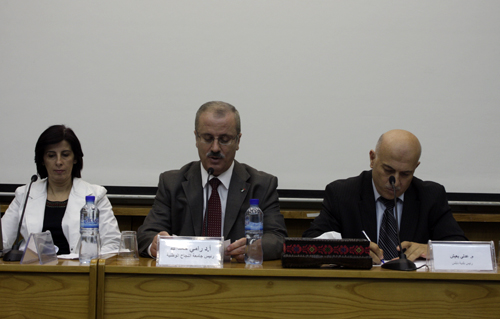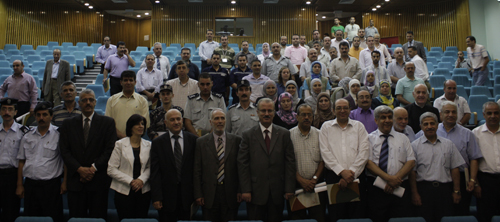The Earth Sciences and Seismic Engineering Center Organizes a Workshop in Cooperation with Nablus Municipality
July 19th 2010. Under the auspices of the University President, Prof. Rami Hamdallah, the Earth Science and Seismic Engineering Center (ESSEC) at the University, in cooperation with Nablus Municipality and the United Nations International Strategy for Disaster Reduction (UN-ISDR), organized the first workshop in Palestine titled "Is Nablus Ready to Deal with Disasters?". The Workshop was held at Martyr Zafer Al-Masri Auditoriums at the Old Campus.
Attendees included Mrs. Anan Atiri, Deputy Governor of Nablus, Engineer Adli Yaish, Mayor of Nablus Engineer Muhammad Dwaikat, Director of the Engineering Communication Center (ECC) at the University, representatives of the police department and the civil defense, a number of engineers and researchers interested in the field of disaster, and disaster risk reduction. Prof. Hamdallah delivered his speech in which he said that natural phenomena cover all parts of the world and they are the interest of most scientists and researchers around the globe. He also added that the dramatic increase in the world population means that if a disaster takes place the number of fatalities will be great. Scientists have proved that disasters are getting more and more severe and unpredictable.

Prof. Hamdallah further said that along with the increase in the world population, there are other elements that would make disasters more deadly such as the increase in the size of cities and residential areas, most of which are not properly designed to face disasters. The majority of cities in the world, especially in the developing countries, have buildings that are not built to withstand for example earthquakes. To deal with this reality, many institutions and organizations have begun to conduct studies and prepare plans to reduce disasters risks. Many governments are now more concerned with having the issue of disaster risk reduction as their main priority, reinforcing and supporting infrastructures, and designing buildings seismically to withstand earthquakes.
In addition to this, most countries are now focusing on developing emergency centers, disaster monitoring systems and others so as to be properly prepared to deal with disastrous situations.
He also mentioned that the University has established the Earth Sciences and Seismic Engineering Center (ESSEC) 15 years ago in order to provide the society with a specialized center that would help in providing consultancy, awareness and education regarding disaster risks. The ESSEC has worked since its establishment on preparing programs and plans to deal with disastrous situations, issuing awareness brochures, holding scientific workshops and seminars, and participating in international conferences on disasters and disaster reduction. The Center also offers courses for the University students on earthquakes, disaster risk reduction, emergency management, courses on seismic design of buildings and risk management.

The ESSEC also cooperates with a number of local, regional and international institutions and organizations in the field of disaster risk reduction and seismic issues so as to exchange experience and knowledge and participate in joint projects.
The workshop consisted of two sessions in which Dr. Jalal Dabeek, Director of the ESSEC, presented a work paper titled "The Extensive Approaches, Strategies, Institutional Frameworks and Disaster Preparedness to Achieve Effective Response According to Hyogo Framework for Action and the United Nations International Strategy for Disaster Reduction". Engineer Ayman Al-Rabba' from Nablus Municipality spoke about the regulations and acts that must be enforced to reduce the impacts of disasters.
Other topics included safety measures, emergency management, and the role of the Engineering Association in designing buildings to withstand earthquakes. Dr. Dabeek also spoke about the basic elements in planning for disasters, and the ten main points that should be taken into consideration in order to face earthquakes.
This event was a very important initiative towards the development of disaster risk reduction measures and prepare the people and the institutions to face disasters properly. With the increasing numbers of disasters that are occurring today, governments are demanded to establish comprehensive preparedness programs and plans in order to reduce the impacts of any disaster.



